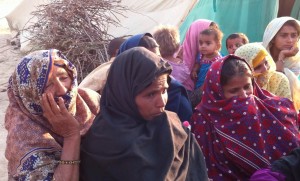October 31, 2011
A word from Ross Mountain: October 2011
For years there has been a general consensus that humanitarian assistance must develop greater sensitivity to gender issues, both in the emergency response and in long term-recovery efforts. However, our Humanitarian Response Index (HRI) research over the past five years in 40 crises analysed, such as the Democratic Republic of the Congo, Sudan, Somalia and Haiti, have clearly demonstrated that advances have been too few and too slow, despite important efforts to raise awareness of the issues.
That is why in this year’s HRI report, to be launched in January, we turn our attention to the issue of gender in emergencies and how donor governments can better leverage their assistance to ensure gender sensitive approaches are integrated into all aspects of humanitarian action. Preliminary findings from our field surveys and interviews on donor practices show that much more needs to be done by humanitarian agencies to assure gender is properly addressed in their programmes, and by donors, to monitor that their funding and support are utilized in ways that guarantee the different needs of all of the affected population are met.
The consequences of a lack of attention to gender range from distribution of culturally inappropriate feminine hygiene kits in Bangladesh or Pakistan to the construction of latrines in IDP and refugee camps without sufficient lighting and security in Haiti or the Democratic Republic of the Congo. But it’s not just about programmes to specifically target women and girls. Men and boys also have specific needs, and programmes, such as reproductive health education campaigns that fail to understand how these differ can have equally negative consequences.
While the majority of OECD DAC donors- 61% according to our figures- have gender policies, very few actually monitor and follow-up with their partners in the field on how gender is integrated into programming. Similarly, many of the donors and humanitarian organisations we interviewed saw initiatives like the gender marker as a bureaucratic procedure (“ticking the boxes”) rather than a basic and essential step in ensuring that humanitarian assistance is non-discriminatory, and allocated on the basis of needs.
At the very minimum, humanitarian organizations and donors should require sex and age disaggregated data to show how programmes address different needs. But they should go beyond this, and realize that gender sensitive analysis is not only about aid quality, it is about aid efficiency. Actively promoting appropriate women’s participation in all stages of programming and verifying that the response is actually adapted to the different population groups is also a must. Without properly understanding the different needs of women, girls, men and boys, humanitarian assistance cannot meet the different needs of the affected population.
DARA is committed to the gender challenge in all areas of our work. We are currently undertaking a research study on behalf of OCHA and UN Women to assess how well gender equality programming (GEP) influences humanitarian outcomes, under the auspices of the Inter-Agency Standing Committee. The study will look at how and under what conditions GEP has or has not contributed to improved humanitarian outcomes, providing previously unavailable solid evidence which will reinforce efforts for better quality, effectiveness and impact of humanitarian interventions.
But gender is not only a challenge for the humanitarian sector. Our research on climate vulnerability indicates that the effects of climate change are more likely to have disproportionate consequences for women and children, both in terms of burden of disease- malaria, malnutrition and other climate-related health problems- and also in terms of livelihoods as women have a vital role to play in farming and agriculture in countries that present the highest vulnerability levels. Droughts and floods will also have serious effects on the lives and livelihoods of women.
Women suffer disproportionately in crises but they can and should also be a major part of an effective response. Humanitarian organizations, encouraged by enlightened donors, should make this happen.

Share this